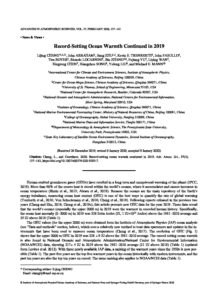Record-Setting Ocean Warmth Continued in 2019

Author:
Lijing Cheng, John Abraham, Jiang Zhu, Kevin E. Trenberth, John Fasullo, Tim Boyer, Ricardo Locarnini, Bin Zhang, Fujiang Yu, Liying Wan, Xingrong Chen, Xiangzhou Song, Yulong Liu, and Michael E. Mann
Publication Year:
2020
Citation:
Cheng, Lijing, John Abraham, Jiang Zhu, Kevin E. Trenberth, John Fasullo, Tim Boyer, Ricardo Locarnini, et al. “Record-Setting Ocean Warmth Continued in 2019.” Advances in Atmospheric Sciences 37, no. 2 (February 2020): 137–42. https://doi.org/10.1007/s00376-020-9283-7.
Description:
Human-emitted greenhouse gases (GHGs) have resulted in a long-term and unequivocal warming of the planet (IPCC, 2019). More than 90% of the excess heat is stored within the world’s oceans, where it accumulates and causes increases in ocean temperature (Rhein et al., 2013; Abram et al., 2019). Because the oceans are the main repository of the Earth’s energy imbalance, measuring ocean heat content (OHC) is one of the best ways to quantify the rate of global warming (Trenberth et al., 2016; Von Schuckmann et al., 2016; Cheng et al., 2018). Following reports released in the previous two years (Cheng and Zhu, 2018; Cheng et al., 2019c), this article presents new OHC data for the year 2019. These data reveal that the world’s oceans (especially the upper 2000 m) in 2019 were the warmest in recorded human history. Specifically, the ocean heat anomaly (0−2000 m) in 2019 was 228 Zetta Joules (ZJ, 1 ZJ=1021 Joules) above the 1981−2010 average and 25 ZJ above 2018.
See related content:
- Explore the site by related topics: Climate Change
